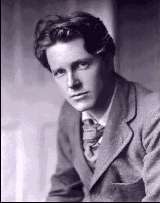
Born: April 3, 1887, in Rugby, Warwickshire, England
Died: April 23, 1915, in Skyros, Greece
Rupert Chawner Brooke was an English poet who was killed, while still young, in World War I. With his youthful boyish looks and charm, he has come to represent the victims of war.
Brooke's father was a master at the Rugby School. His mother, Mary Ruth Cotterill Brooke, was a strong-willed Puritan. Brooke was one of three surviving brothers. His other brothers died as children.
While at Rugby, Brooke excelled at both his studies and sports. He won two prizes for his poetical works, Pyramids and The Bastille, which the school published in 1904 and 1905, respectively. His early writings were very much influenced by authors such as Wilde, Baudelaire, and Swinburne. Later, he met Yeats, under whose direction he turned away from the style of his early mentors.
He graduated from King's College, University of Cambridge in 1906 and became a prominent member of the Fabian Society. He loved several women, but none of the relationships came to any happy resolution.
His first collection of work, Poems, was published in 1911. Brooke traveled the United States, Canada, Italy and Germany extensively, but the location that inspired The Old Vicarage, Grantchester was the countryside close to his home. His most noted work was a collection of idealistic poems called 1914 and Other Poems, published in 1915. Notes from his travels were published in 1916 under the title Letters from America.
Brooke was a sub-lieutenant in the British Navy during World War I. He survived the assault on Antwerp, but on the return voyage, died of blood poisoning. Posthumously, Letters of Rupert Brooke was published in 1968. This work, unlike 1914 and Other Poems, depicts the tragedy of war.